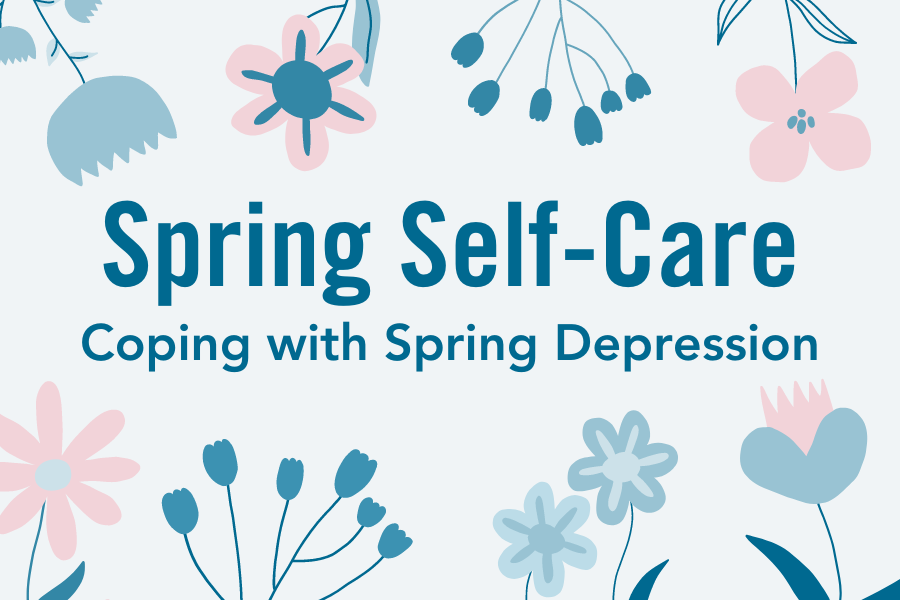Spring Self-Care: Coping with spring depression
It’s a generally accepted belief that seasonal depression occurs during the winter. It makes sense that cold weather and less sunlight can cause people to feel a bit down. This can especially affect those who may already struggle with mental health. What is less common to hear about is spring depression.
Most people look forward to spring and excitedly anticipate warmer weather. Yet, warmer, longer days aren’t necessarily the perfect remedy for seasonal depression. In fact, for some people, the transition from winter to spring acts as a trigger for mental health issues.
Reverse SAD?
Changes in routine and weather are often triggers for mental health issues. Just as the days getting shorter and the weather getting colder in the fall and into winter can cause SAD (Seasonal Affective Disorder) in some individuals, the lengthening of days and sudden warm weather can trigger spring depression in others. It’s critical to be aware of how these seasonal changes can affect mood so you can understand your feelings and take proactive measures to manage stress.
While the causes of winter SAD seem pretty straightforward, researchers don’t know precisely what causes seasonal depression. However, as physician and psychiatrist, Dr. John Sharp, pointed out in his book, “The Emotional Calendar”, the change in seasons affects us deeply.
We must understand that our bodies are sensitive to change. More sunlight can result in trouble sleeping and even severe insomnia for many individuals. Additionally, as the snow melts, we see the return of allergens such as snow mold and a variety of pollen. Allergies have actually been linked to depression in many individuals –which makes sense since feeling sick and miserable all the time isn’t great for your mental health.
Socially, the season change can be disruptive as well. While many of us love that the warm weather brings our local communities alive with people spending more time outside, others may find that the sudden change from a quiet, peaceful neighborhood to a busy one will trigger their social anxiety. Additionally, the expectation we put on ourselves to enjoy the warm weather to its fullest can cause anxiety and frustration.
Symptoms to watch for:
- Insomnia
- Agitation or Anxiety
- Uncharacteristic irritability
- Fatigue or lack of energy, feeling sluggish or ‘blah’
- Loss of interest in activities you normally enjoy
- Loss of appetite, weight loss
It is critical not to ignore the above symptoms. While the changing of seasons can affect us all, it is important to pay attention to how you are feeling and how the season is affecting you. Mental health can easily get away from us when we aren’t paying special attention to ourselves or taking the time for self-care. If you find yourself feeling unmotivated and your mood low for multiple days, or if you’re having difficulties sleeping, it is wise to seek professional help.
Ways to Cope
The first step in coping with spring depression is to acknowledge the change and how it is affecting you. Our bodies don’t like big changes in weather, air pressure, daylight, or lifestyle in general. It is important to practice self-care in order to take care of yourself during these times. You can learn about meaningful self-care with our step-by-step guide and template on How to Create Your Own Personalized Self-Care Plan.
Avoid getting caught in negative thinking patterns like “I need to get out there, I’m wasting the warm weather” or “everyone is happy that it’s spring except me”. Acknowledge these thoughts and see them as indications of your state of mind, but do not allow them to trap you. Instead, try to get natural light whenever you can, but don’t beat yourself up if your schedule or circumstances don’t allow you to spend copious amounts of time outdoors. Even sitting next to a window on a sunny day or taking a short walk during your lunch break can go a long way.
Create a routine and stick to it. The change in seasons may be disruptive to your daily patterns, so it is helpful to maintain a sense of routine. Within that schedule, make sure to give yourself time and space for creative and meditative outlets such as art, journaling, yoga, and meditation.
Get enough sleep. That is easier said than done when your circadian rhythm is so altered by more daylight, warmer weather, and daylight savings. Sleep is super important for mood regulation. Having a routine and getting out in the sun during the day can help you get back on a healthy sleep schedule. Limiting screen time in the evenings can also help. If you are struggling to get enough sleep, you should also bring it up with your doctor.
Finally, it is tempting to hide away when you feel anxious or down but avoid isolating yourself. Make sure to spend some time with your friends and family. If you are experiencing severe symptoms of spring depression it can be particularly beneficial to seek help from a professional. Talking to a therapist or counselor can make a huge difference.
And remember, Distress Centre is here for you whenever you need support. When April showers bring more troubles than flowers, you can always give us a call. Phone or text: 403-266-4357 or chat online through the chat portal:

